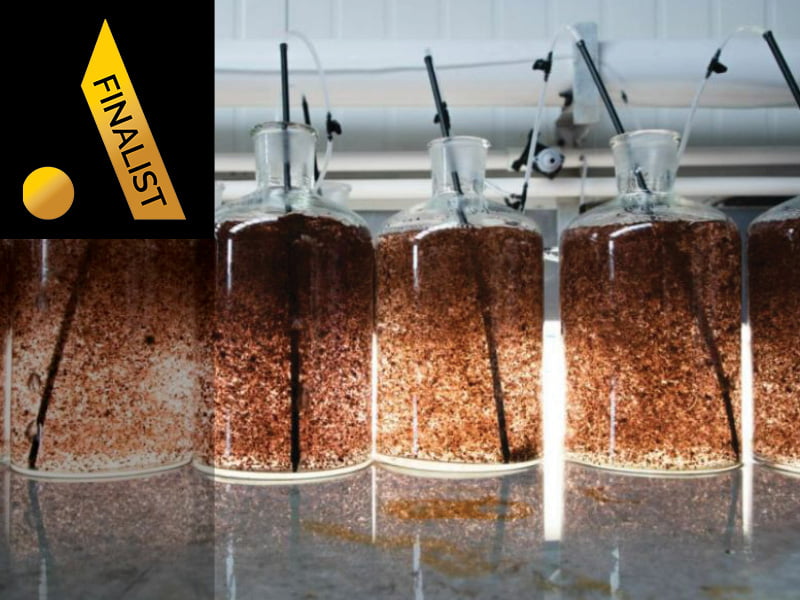When one conjures up the image of sheep eating seaweed, it could almost be comical – a scene out of popular kid’s show, Shaun the Sheep; the protagonist diving into the ocean, dressed in full diving regalia, fork in hand, searching for a salty sea snack.
In reality, the relationship between seaweed and livestock has the potential to seriously curb emissions in the agriculture sector.
Research has shown that it only takes as little as one per cent of dried seaweed mixed in to feed to disrupt methane production in ruminants. The seaweed-infused feed can reduce methane emissions from livestock by as much as 98 per cent.
Asparagopsis taxiformis, a red algae native to Australia, reacts with vitamin B12 during digestion, effectively removing most of the methane caused by the fermentation of plant matter in the animal’s stomach.

Agriculture accounts for about 13.5 per cent of Australia’s greenhouse gas emissions, with methane produced by livestock making up the majority.
CSIRO estimates that if just ten per cent of the world’s livestock industry used an Asaparagopsis-based additive, it would be the equivalent of taking 100 million cars off the road.
Sea Forest Limited chief executive Sam Elsom, saw this as an opportunity – not only to establish a successful enviro-tech company but to help fight climate change.
“CSIRO discovered that if you feed a certain amount of seaweed to cattle that it produces this incredible abatement. That novel discovery is really a concept. Nobody in the world knew how to grow it – that’s what Sea Forest is invested in,” Mr Elsom explained.
Mr Elsom started Sea Forest in 2018, inspired by Tim Flannery’s research into the effects of seaweed on climate change. It marked a significant change for Mr Elsom, who worked as a fashion designer before starting Sea Forest.
Sea Forest is a finalist in the Food and AgriTech category of the inaugural InnovationAus Awards for Excellence 2021. You can reserve your seat at the December 1 black tie event in Sydney by clicking here.
“As someone who was already an environmentalist and who was using business to make an impact, I became really interested in understanding what more we could do and what were the possible solutions that existed. I learned on that journey about seaweed,” he said.
During the company’s first two years, Sea Forest raised $34 million with seed funding. Investors ranged from Peter Gunn’s PGA, Rob Purves and the agricultural investment arm of Macquarie Infrastructure and Real Assets, among others.
Sea Forest is putting the money towards building a 1,800 hectare marine farm and processing facility near Hobart to establish a commercial supply of Asaparagopsis to the livestock and dairy industries.
For Mr Elsom, it has been the quality work of Sea Forest’s team of scientists, headed by Professor Rocky de Nys, that gave the company traction with investors.
“The success of Sea Forest has been largely built around the Professor and his research team that are the world leaders in Asparagopsis. Using his knowledge as a base, as well as his guidance in cultivations methods and techniques, we’ve been able to develop those [cultivation and production] methods,” Mr Elsom said.
Early on, Sea Forest commissioned the University of Tasmania, James Cook University in Queensland and Waikato University in New Zealand to help with research and development. The results helped Sea Forest establish its IP around the cultivation and production of Asparagopsis.
“We went really quickly in terms of our progress – using that network of research both from our farm and the research group we retained and the three different commissions. That’s what helped us grow really quickly and close knowledge gaps,” Mr Elsom said.
Sea Forest is currently in the process of getting its product market ready. They are trialing their feed with New Zealand dairy giant, Fonterra, as well as with local Tasmanian wool producers.
In February this year, Sea Forest was the recipient of an Accelerating Commercialisation grant from the Commonwealth of $1.1 million over the next five years. The grant will help the company become Australia’s industry leader in seaweed cultivation.
“The Accelerating Commercialisation grant really lets us commercialise and expand and scale our IP that we’ve developed around the cultivation of Asparagopsis,” Mr Elsom said
“There’s no seaweed aquaculture business in Australia. In the short time, we’ve been around, we’ve become the largest seaweed operation in the Southern Hemisphere.”
Sea Forest Limited is a finalist for the InnovationAus Awards for Excellence 2021 in the Food & AgriTech category. You can reserve your seat for the December 1 black-tie awards ceremony here.
Do you know more? Contact James Riley via Email.

It would take tonnes of Seaweed each day to reduce the amount of methane coming from farm animals. As I understand it a cow needs around 280g of this seaweed mixed in the feed each day to reduce the methane they produce. Now considering there are around 140million livestock in Australia at any one day, this could be a huge business to get into. One that has many benefits towards sustainability.